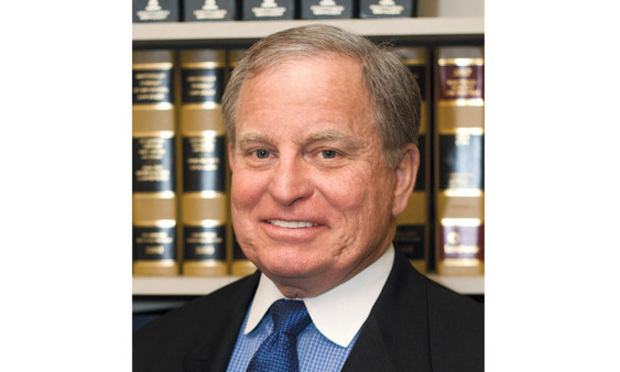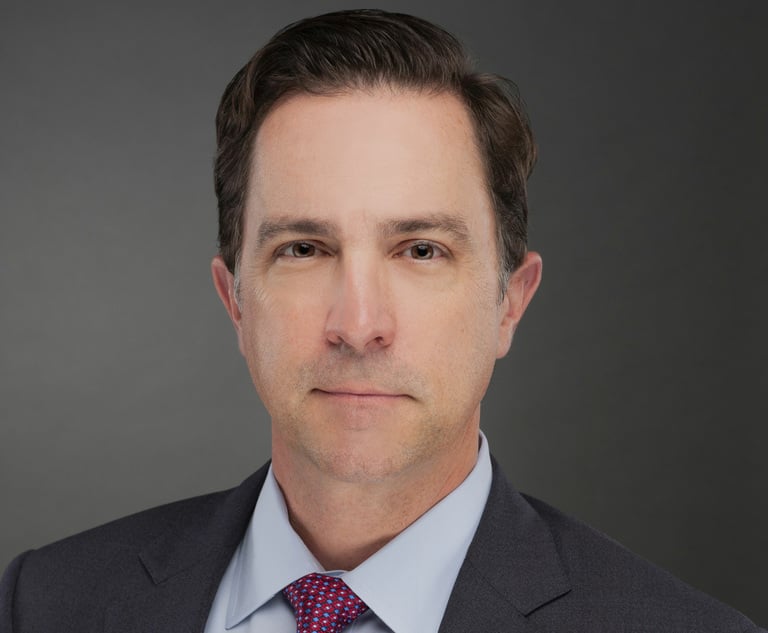After Reversing His Disbarment, Houston Court of Appeals Affirms 2-Year Suspension of Robert S. Bennett
Bennett was disbarred in March 2014 after a specially assigned state district judge concluded that he had violated two rules of the Texas Disciplinary Rules of Professional Conduct.
December 28, 2018 at 05:34 PM
4 minute read
 Robert S. Bennett/courtesy photo
Robert S. Bennett/courtesy photo
Two years after overturning his disbarment and remanding his case back to a district court for further consideration, Houston's Fourteenth Court of Appeals has affirmed a two-year suspension of Robert S. Bennett related to his fee dispute with a former client.
Bennett, whose practice includes defending lawyers from State Bar of Texas disciplinary suits, was disbarred in March 2014 after a specially assigned state district judge concluded that he had violated two rules of the Texas Disciplinary Rules of Professional Conduct.
Specifically, the trial court judge concluded Bennett violated Rule 1.15(d), which requires a lawyer on termination to refund any advance payments of fees that have not been earned, and Rule 3.02, which prohibits a lawyer from taking a position that unreasonably increases the costs or unreasonably delays the resolution of a matter.
After his disbarment, more than 1,000 Texas lawyers signed a request of amici curiae characterizing Bennett's punishment as an “extreme result” that was “unfair” and “does not foster the respect and confidence in our disciplinary system that are essential within the Texas bar.”
Bennett appealed his disbarment to the Fourteenth Court. In 2016, the appeals court reversed Bennett's disbarment after concluding that Bennett had violated Rule 3.02, but found that there was insufficient evidence that he violated Rule 1.15(d) and remanded the case back to the trial court to reconsider an appropriate sanction.
On remand, the trial court ordered that Bennett be suspended for a period of two years, six months and three days, including two years and three days of active suspension and six months of probated suspension.
Bennett again appealed the punishment to the Fourteenth Court by arguing there was insufficient evidence to support the trial court's decision to impose the partially probated suspension among other things.
And in its most recent decision, the Fourteenth Court concluded there was enough evidence that Bennett violated Rule 3.02 to support the trial court's decision to suspend Bennett's law license.
“Based on the record evidence, it was within the trial court's discretion to conclude that Bennett's misconduct toward his client, Gary Land, was particularly serious and damaging because it significantly delayed the resolution of their fee dispute and dramatically increased the cost Land incurred as a result,” wrote Justice Brett Busby.
“Bennett's misconduct included appealing the confirmed arbitration award in favor of Land regarding their fee dispute despite having agreed not to do so, delaying execution of the judgment against him, and suing Land for fraudulently inducing Bennett into accepting Land as a client,” Busby wrote.
The decision points out in a footnote that the probated portion of Bennett's suspension ended on Dec. 31, 2017.
Bennett said he will appeal the Fourteenth Court's new ruling. He also notes that his law license was reinstated in 2016 after the appellate court overturned his disbarment and he's been practicing law ever since.
“We'll be filing a motion for rehearing and continuing the appellate process. And it will be nice that a whole new set of judges will be listening to the next round,'' Bennett said, noting that the Fourteenth Court panel that heard his appeal, including Republican Justices Busby, Bill Boyce and Marc Brown, all lost their re-election bids to Democratic challengers in the November 2018 General Election.
“They didn't address the issues we raised about how it was wrongly decided at the district court level,'' Bennett said.
Randy Roach, a Houston attorney who acted as a special assistant disciplinary counsel for the State Bar of Texas' Commission for Lawyer Discipline in the case, did not return a call for comment.
This content has been archived. It is available through our partners, LexisNexis® and Bloomberg Law.
To view this content, please continue to their sites.
Not a Lexis Subscriber?
Subscribe Now
Not a Bloomberg Law Subscriber?
Subscribe Now
NOT FOR REPRINT
© 2025 ALM Global, LLC, All Rights Reserved. Request academic re-use from www.copyright.com. All other uses, submit a request to [email protected]. For more information visit Asset & Logo Licensing.
You Might Like
View All
Federal Judge Approves Harvard's Dismissal of Chip-Patent Suit Against Samsung
2 minute read
O'Melveny, White & Case, Skadden Beef Up in Texas With Energy, Real Estate Lateral Partner Hires
5 minute read
Chamberlain Hrdlicka Taps a New Leader as Firm Follows Succession Planning Path
3 minute read
Trending Stories
Who Got The Work
J. Brugh Lower of Gibbons has entered an appearance for industrial equipment supplier Devco Corporation in a pending trademark infringement lawsuit. The suit, accusing the defendant of selling knock-off Graco products, was filed Dec. 18 in New Jersey District Court by Rivkin Radler on behalf of Graco Inc. and Graco Minnesota. The case, assigned to U.S. District Judge Zahid N. Quraishi, is 3:24-cv-11294, Graco Inc. et al v. Devco Corporation.
Who Got The Work
Rebecca Maller-Stein and Kent A. Yalowitz of Arnold & Porter Kaye Scholer have entered their appearances for Hanaco Venture Capital and its executives, Lior Prosor and David Frankel, in a pending securities lawsuit. The action, filed on Dec. 24 in New York Southern District Court by Zell, Aron & Co. on behalf of Goldeneye Advisors, accuses the defendants of negligently and fraudulently managing the plaintiff's $1 million investment. The case, assigned to U.S. District Judge Vernon S. Broderick, is 1:24-cv-09918, Goldeneye Advisors, LLC v. Hanaco Venture Capital, Ltd. et al.
Who Got The Work
Attorneys from A&O Shearman has stepped in as defense counsel for Toronto-Dominion Bank and other defendants in a pending securities class action. The suit, filed Dec. 11 in New York Southern District Court by Bleichmar Fonti & Auld, accuses the defendants of concealing the bank's 'pervasive' deficiencies in regards to its compliance with the Bank Secrecy Act and the quality of its anti-money laundering controls. The case, assigned to U.S. District Judge Arun Subramanian, is 1:24-cv-09445, Gonzalez v. The Toronto-Dominion Bank et al.
Who Got The Work
Crown Castle International, a Pennsylvania company providing shared communications infrastructure, has turned to Luke D. Wolf of Gordon Rees Scully Mansukhani to fend off a pending breach-of-contract lawsuit. The court action, filed Nov. 25 in Michigan Eastern District Court by Hooper Hathaway PC on behalf of The Town Residences LLC, accuses Crown Castle of failing to transfer approximately $30,000 in utility payments from T-Mobile in breach of a roof-top lease and assignment agreement. The case, assigned to U.S. District Judge Susan K. Declercq, is 2:24-cv-13131, The Town Residences LLC v. T-Mobile US, Inc. et al.
Who Got The Work
Wilfred P. Coronato and Daniel M. Schwartz of McCarter & English have stepped in as defense counsel to Electrolux Home Products Inc. in a pending product liability lawsuit. The court action, filed Nov. 26 in New York Eastern District Court by Poulos Lopiccolo PC and Nagel Rice LLP on behalf of David Stern, alleges that the defendant's refrigerators’ drawers and shelving repeatedly break and fall apart within months after purchase. The case, assigned to U.S. District Judge Joan M. Azrack, is 2:24-cv-08204, Stern v. Electrolux Home Products, Inc.
Featured Firms
Law Offices of Gary Martin Hays & Associates, P.C.
(470) 294-1674
Law Offices of Mark E. Salomone
(857) 444-6468
Smith & Hassler
(713) 739-1250






